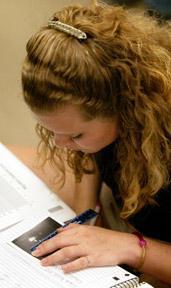Most of the campus community would not expect to see high school teachers working as students in a Life Sciences lab.
The teachers are participating in the Microbiology and Molecular Biology Outreach Program, which is sponsored by the College of Basic Sciences.
The workshop is offered to all high school teachers, says Program Coordinator Sheri Wischusen.
“The program gives teachers the experience and opportunity to use research techniques they otherwise would not be exposed to,” said Steven Wilkinson, a biochemistry graduate student helping the program.
Annette Gentry, a biology and chemistry teacher at Zwolle High School in Sabine Parish, said the workshop has made it possible for her to stay up to date with the current techniques used in science.
Twenty years ago, many of the techniques teachers are learning thorough the program were not available, Gentry said.
Gentry said she finds it exciting to learn and use equipment not available in a rural parish like Sabine.
Wilkinson said the teachers learn techniques used to study genes.
One of the experiments teachers are learning involves the use of Recombinant DNA and E. coli, said Wilkinson.
Wilkinson said the teachers will learn how to combine two strands of DNA from different sources.
Wilkinson also said the teachers’ eagerness to learn contributes to them having a better understanding of the information the program provides.
Wilkinson said it is a good idea to have a program in which teachers are able to carry these techniques back to their students.
When the students get to college they will not be shocked by techniques used in University science classes, Wilkinson said.
Thomas Avant, an agricultural science teacher at Pitkin High School in Vernon Parish and instructor for the program, said he found it really easy to apply what he learned at the workshop to his classroom.
Teachers in the program are eligible to borrow materials from the University that their schools would otherwise not be able to afford, Wischusen said.
“It is tremendous,” said Avant. “They sent us cutting edge material that most high school students could only dream of using.”
Gentry said she hopes to borrow equipment to show her students the important points of science.
Wischusen said the program also uses teachers who already have completed the program to help participating teachers find problems students may face with the material before it happens.
Because the instructors already have participated in the program and borrowed the equipment, they already know how students will react to the exercises, Wischusen said.
Gentry said she knows not all of her students will grasp concepts she learns from the program.
Fountainbleau High School teacher Terry Tony said she is not worried about not getting the information to her students.
As a teacher it is her job to take the information the program has given them and put it in a form her students can understand, Tony said.
Tony said she is worried she will not be able to introduce some of the longer experiments to her students because of the amount of time she will use to spend preparing her students for standardized tests.
Environmental science and biology teacher Daniel Scheer said doing all the experiments will benefit students because the newer version of the high school EXIT exam contains questions that deal with scientific research.
Wischusen said this is the first year the program has actually had students participate.
The six students and their teachers are members of an agricultural group on campus, Wischusen said.
Iota High School senior Blanche Lacomb said the experience has been beneficial for her.
“I make the point to understand it here because high [school] teachers would lower the level [of teaching the program provides],” Lacomb said. “College professors challenge me to keep up with what is being said.”
College hosts microbiology lab workshop
June 17, 2003




